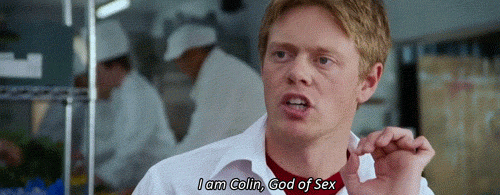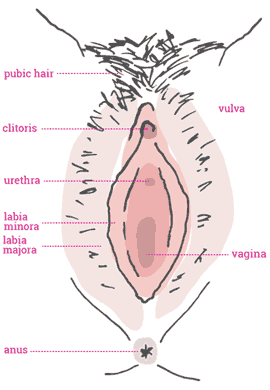Human beings are incredibly complex, and the intricacy of our biological bodies create room for enormous diversity in their structure and function. So when we acknowledge that "sex" is a combination of sexual organs, reproductive systems, chromosomes and hormones, we can understand how there is in fact a large spectrum of sexes; so many different physical and chemical combinations of "sex" can and do exist. It is extremely common for people with vulvas, female reproductive systems and breasts to have “male” levels of testosterone. Nor is it particularly “strange” for someone to be born with neither the XX nor XY chromosome patterns. Many babies each year are born with both, neither, or a mix of both the “male” and “female” genitalia. Basically, intersex people are very common, and despite the social stigmas, they are alive, healthy and fully functioning. Check out more statistics at www.isna.org/faq/frequency.
When we accept that the biological science of sex isn't particularly straightforward, we start to struggle more with this idea of gender. "Gender" is apparently inherent traits of a particular sex, but if so many people exist outside a black and white male/female sexual reality, and so many people identify as transgender or non binary, how can this hold true? It is difficult to justify how oestrogen makes women more apt to an arts degree rather than STEM subjects, or how a Y chromosome makes boys prefer blue to pink in the face of the very real diversity that exists with every unique person. The conclusion that many feminists have come to is that "gender" is a socially constructed concept, and is far less natural than we like to think it is.
When we start looking at typical feminist issues such as women's role in the workforce, it is easy to see how the "female gender" actually disadvantages people who identify as women. Although women may be excellent politicians, the idea that the all females have a strong and inherent maternal instinct has held us back from positions of power throughout history, as it has been believed that we will not be able to make the difficult decisions. Although women may be fantastic scientists, the idea that we are more inclined to creativity rather than logic has, and continues to, block STEM opportunities for women. What we continually see is that women are discredited from entire fields of work because of assumptions based on the "biological essence of the female gender", despite the huge diversity that exists in 50% of the world's population, and despite varying levels of oestrogen having a fairly minimal impact on rational decisions made by a trained and educated employee. This issue detrimentally affects men, as well. Men who wish to take on more traditionally "feminine" roles such as early education and child care are discouraged from doing so, as "women's" work is beneath the entitled capacity of men. Again, this is in spite of men's very real ability to be excellent fathers, child carers and preschool teachers even though they may contain higher levels of testosterone, and not have a functional womb.
However, as much as a the feminist dream is a world without gender where people can express themselves and make choices purely based on what they like rather than pre-ordained roles, this world can likely never be achieved due to the entrenched ideas of gender that are built into the metaphorical fabric of society. Moreover, most radical feminists are willing to accept that biology isn't 100% irrelevant, the difference between my body and my brother's body does contribute to some of our differences. Testosterone does make muscle easier to build, and oestrogen does more easily trigger protective and possessive emotions.
The issue then lies with society's priorities of biological capacity.
We have come to believe in so many ways that men are "better" than women purely because of biology. We have come to believe that the "maternal instinct" is an undesirable trait, that means women are bad at corporate jobs, and will always be annoying, over-attached girlfriends. We have come to believe that dunking the ball in basketball is a sign of superior athletic ability, and so men are better than women at basketball due to their natural testosterone and height.
This is arbitrary.
If you grew up in a world where the most valued thing was the ability to relate to young children, and running a business was not a desirable job choice, you would likely view the female gender as "better" than the male, and pride the role of mother above the role of corporate leader. If you grew up in a world where the whole point of basketball was defence, and keeping it on the court, then you wouldn't value men's ability to jump and dunk the ball.
When we properly step through the links between sex, gender, and personality traits, we see that if often doesn't line up into the neat gender binary we perceive there to be, and we must accept that "male" and "female" are not natural states of being for so many people. However that doesn't mean biology has zero impact. Maybe men are stronger and faster because of a chemical composition that some people with penises also possess. But this does not make them inherently "better"; men are only "better" than women because of the relative values created by society, which arbitrarily favour men due to several thousand years of patriarchal society. Maybe people with certain combinations of organs and hormones are different from another group, but we must accept that the idea of valuing certain trains associated with these differences over others not nature, but generations of accepted expectations and norms that have become ingrained in our society.
Comment below!
Love, Hannah


